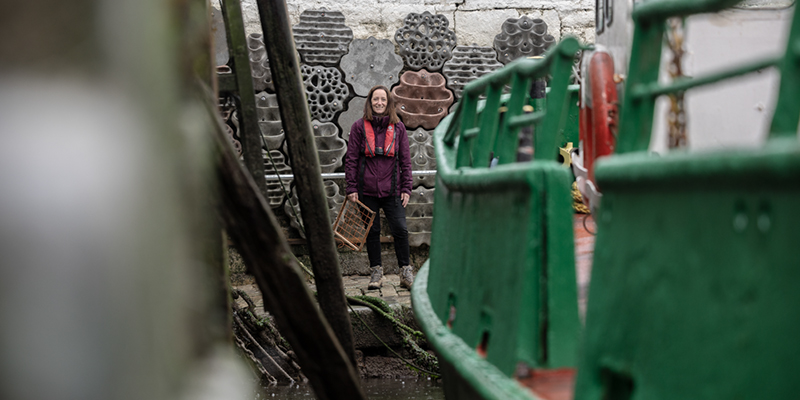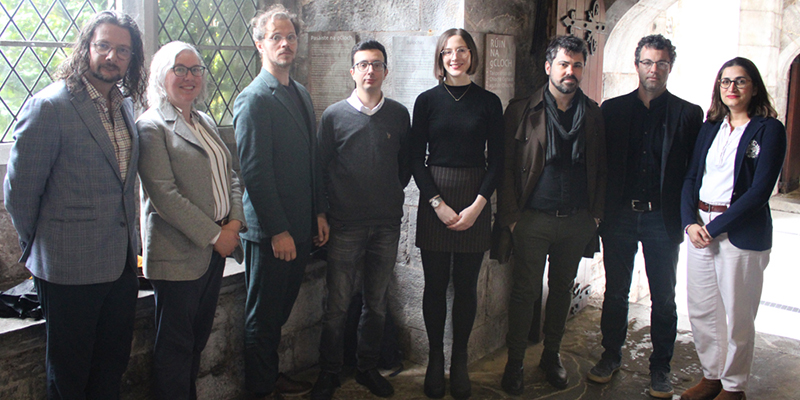In This Section
UCC researchers receive €1.1m to address national and global societal challenges

The installation of the first living seawall in Ireland, and the use of energy-efficient digital tools for community-led cultural preservation are among the University College Cork (UCC) projects to receive a combined €1.1 million funding under Research Ireland’s COALESCE 2025 programme.
COALESCE (Collaborative Alliances for Societal Challenges) supports excellent, interdisciplinary research that addresses national and global societal challenges by fostering collaboration between researchers and policymakers, civil society, and enterprise.
UCC has been awarded funding for five interdisciplinary projects between researchers across research areas in AHSS (Arts, Humanities and Social Sciences) and STEM (Science, Technology, Engineering and Maths), making UCC the highest performing institute in the COALESCE 2025 programme.
Announcing funding of over €3.5 million for 16 research projects under the COALESCE programme, Minister for Further and Higher Education, Research, Innovation and Science, James Lawless TD, said: "Harnessing the power of research is key to tackling the most pressing challenges facing our society. These awards are not just about academic excellence – they are about delivering real, tangible benefits for people and communities. Whether it is supporting survivors of gender-based violence, driving climate action, or safeguarding our cultural heritage, these projects will make a meaningful difference. This is research with purpose, and I commend all the awardees for their dedication to the public good."
Professor John F. Cryan, UCC Vice President for Research and Innovation, said: “I would like to congratulate our researchers at UCC who will lead a 2025 COALESCE Programme award. Interdisciplinary and engaged research are at the heart of UCC’s research ecosystem, and these awards will further strengthen UCC’s position as a leader in these areas by bringing together diverse disciplines, communities, and policy partners to address key societal challenges.”
Among the new research projects totalling €1.1 million that will be funded at University College Cork are:
 Photo (L-R): Dr James Cuffe, Dr Sarah O'Connell, Dr Jesse Peterson, Dr Paolo Palmieri, Dr Kate Falconer, Dr James O'Sullivan, Dr Tim Sullivan, Dr Mastoureh Fathi.
Photo (L-R): Dr James Cuffe, Dr Sarah O'Connell, Dr Jesse Peterson, Dr Paolo Palmieri, Dr Kate Falconer, Dr James O'Sullivan, Dr Tim Sullivan, Dr Mastoureh Fathi.
TechnoAnthropology of Heat in Social Housing Retrofits (TEASA)
Funding Amount: €219,973
Dr James Cuffe (Lead Researcher), Department of Sociology & Criminology, UCC College of Art, Celtic Studies and Social Sciences; Dr Sarah O’Connell (Co-PI), UCC College of Science, Engineering & Food Science.
This project addresses issues around community engagement and dissatisfaction with building energy retrofit in social housing, a key measure in Ireland’s Climate Action Plan. The case study site is a Cork City community where some residents are reporting dissatisfaction with their homes post retrofit. It is a representative example of the general issue, where there is uncertainty about whether the technologies deployed in the retrofit are not working as expected (an engineering problem) or whether the dissatisfaction is more of a social nature within which the retrofits are failing to meet social expectations, are being mis-utilised, or have become embroiled in other social issues and now operate as a kind of symbolic malaise (an anthropological problem).
Making Body Disposal in Ireland Environmentally and Socially Sustainable (BoDIESS)
Funding Amount: €219,949
Dr Kate Falconer (Lead Researcher), School of Law and Radical Humanities Laboratory; Dr Tim Sullivan (Co-PI), School of Biological, Earth & Environmental Sciences.
This project will use methodological tools drawn from socio-legal studies and environmental science to develop new insights into changing body disposal preferences in communities across Ireland. To ensure Ireland can meet the social, environmental, and regulatory challenges of modern body disposal, it will establish the foundations for industry standards and policy guidelines addressing all funerary methods that are modern, certain, consistent, socially cohesive, and environmentally responsible.
Minimal Curation: Minimal Computing for Sustainable Digital Sociocultural Heritage
Funding Amount: €219,949
Dr James O’Sullivan (Lead Researcher), Digital Humanities; Susan Rae (Co-PI), Nimbus Research Centre, Munster Technology University.
Minimal Curation will explore how digital systems that require minimal energy, bandwidth, and processing power can transform digital preservation. By prioritising lightweight, energy-efficient technologies, the project aims to empower under-resourced arts organisations and marginalised communities to curate, safeguard, and share their cultural narratives in a sustainable manner.
Migrants’ Digital Spaces: technology-assisted analysis of home, border and belonging (MIGDIS)
Funding Amount: €219,990
Dr Mastoureh Fathi (Lead Researcher), Department of Sociology & Criminology; Dr Paolo Palmieri (Co-PI), School of Computer Science & Information Technology.
MIGDIS is a research project exploring the impact of technology on migrants’ sense of home in Ireland and Turkey. The research team, made up of sociologists and computer scientists, is studying how smartphones, online spaces, and smart home devices help, or sometimes hinder, migrants in building a sense of belonging. The project could inform safer tech design and amend current housing policies.
From Artificial to “Living” Seawalls: Investigating how Sustainable Coastal Infrastructures Contribute to Multispecies Society (LivingCoasts)
Funding Amount: €219,990
Dr Jesse Peterson (Lead Researcher), Department of Geography and Radical Humanities Laboratory; Dr Louise Firth (Co-PI), School of Biological, Earth and Environmental Sciences.
LivingCoasts will research the ecological, social, and ethical impacts that accompany the installation of ‘living seawalls’ in Cork County. ‘Living seawalls’ is a term that describes a set of tiles made from concrete and that can be affixed to flat, manufactured structures bordering the coasts in order to provide habitat to marine organisms that used to live in these areas. The project will establish an integrative research model and will contribute to understanding the possibilities and pressures related to contemporary and future sustainable urban coastal development.
The 16 funded projects span the following 10 research institutions: Atlantic Technological University (1), Dublin City University (3), Maynooth University (1), Munster Technological University (1), Royal College of Surgeons in Ireland (1), Trinity College Dublin (1), University College Cork (5), University College Dublin (1), University of Galway (1), and University of Limerick (3).
